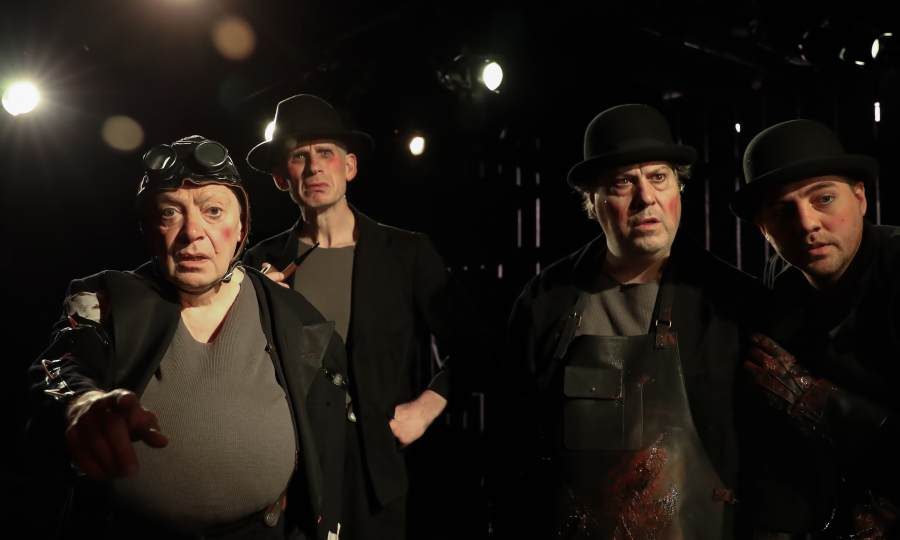

For whatever reason, there seems to be an upsurge in absurdist theatre lately. Maybe it's because the last two years felt like a badly scripted Beckett play. At any rate, the newest is Randy Sharp's Worlds Fair Inn, presented by Axis Theatre Company. Based on the story of H. H. Holmes' notorious "Murder Castle," a hotel built for the 1893 World's Fair, the play also draws inspiration from Victor Frankenstein and J. Robert Oppenheimer, father of the atomic bomb.
While the play itself is a little bewildered and may not hold up 100% under scrutiny, it makes up for any messiness by wielding these concepts in vastly interesting ways. After my initial confusion, I found that like the tip of an iceberg, the play yielded more upon deeper reflection.
Frank, a crazed scientist, architect, and doctor, hires two contractors to help him build an inn for World's Fair visitors. Of course, that inn has an ulterior motive. He'll use it to murder people, then piece together their body parts to create a new man/machine as an exhibit for the World's Fair. "The president said it was okay," he keeps insisting--a statement that acts as a sort of carte blanche for morally questionable actions.
Meanwhile, Frank is incredibly disoriented as regards his own past. He seems to remember having a girlfriend or wife who died in a fire. Sometimes it's a factory fire, sometimes a house fire that Frank watches from his hiding place. He's also lost his brother, who was always sick, and somewhere in there, there's something about Japan.
In hindsight, I see Worlds Fair Inn as not being explicitly about the World's Fair, Frankenstein, or the Murder Castle. Instead, it's a metaphor for the creation of the atomic bomb, which explains the Japan thing and the president's OK. Sprinkled throughout are other veiled references to the atomic bomb: "buildings falling to sidewalks in summer," "a shadow on the ground," and the characters' constant premonition that something is going to blow up.
Frank admits to having no real purpose behind his Frankenstein experiment, he just wants to "see what happens." In other words, as Jeff Goldblum put it: "your scientists were so preoccupied with whether or not they could, they didn't stop to think if they should." At one point, the machine man recites T. S. Eliot's "The Hollow Men," a perfect summation of the humanity lost with the creation and detonation of the atom bomb.
Speaking of the machine man, he is played with enormous pathos by Edgar Oliver, sort of like a more graceful, existential Boris Karloff. His very voice, strangely sonorous, sounds hollow, and his performance is both uncanny and endearing. Elsewhere, the actors navigate a Dadaist script with humor and expression, if not always the complex sensitivity it requires. While Worlds Fair Inn isn't for everyone--its nonsensical absurdism and disturbing plot points may make it a hard sell for some--it's a thoughtful piece of existential theatre, something like a T. S. Eliot poem made flesh.
Worlds Fair Inn runs through October 23 at Axis Theatre (1 Sheridan Square, Manhattan). Tickets are on sale now at the link below: